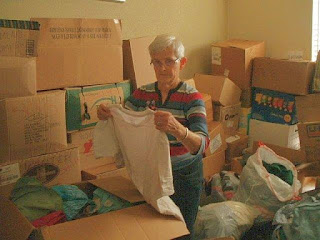What are the graces and
learning's from spending time in a refugee shelter? Both Old and New Testament
readings provide food for reflection. God holds out a promise which is repeated
over time to people who are on a journey, who have suffered the loss of their
homeland, who have been driven into slavery, and who still have hope in the God
who saves.
In the busyness of trying to
provide basic necessities to people who have none in the Nazareth Shelter, it
is easy to get lost. It is easy to think that I am the giver and “they”
are the receivers. Nothing could be farther from the truth! I can only
offer a few brief stories.
Early on, I met a man from
Guatemala who spoke very good English. He had worked for a company in
Rhode Island for five years before he returned to Guatemala. He was with his
17-year-old son. They had left quickly because the son had been recruited by a
gang and the father did not want him to join. Part of the initiation he said
was to kill people! They had but two days to leave the country before the gang
would come back and perhaps kill them or family members. He had to move his
wife and three other children to his in-laws where they would be safe for a
while. He told me that an American friend from Rhode Island had been visiting
when the gang members came and he could be a witness to the encounter. His
former employer wanted him back.
The 17-year-old son was a
college student. Both father and son spent their time at the shelter helping
others. They arranged the food shelves in the kitchen. They helped clean in the
dining room. They assisted a Brazilian man who did not speak Spanish with his
young daughters.
Some women were victims of
domestic violence. A husband told his wife he would kill her if she and
her daughter did not leave the home.
One of the women who helped
fold clothes in the clothing room had just lost her husband who had been shot
in Juarez the previous week!
Some had walked for months and
found work on the way to support themselves. A woman spoke of generous Mexican
families who took them in and helped them on the way. Some had money and were
able to travel by plane or bus to Mexico.
Most had only the clothing on
their backs. These were the “lucky ones” who had come through Juarez and had
been processed and released by ICE (Immigration Customs
Enforcement) to come to the shelter where volunteers would contact their
families or friends and arrange transportation for them if their families could
provide money for tickets by bus or airplane.
Most of those who were
processed were given ankle bracelets that would track their whereabouts until
they reached their destination. The devices can only be removed by the judge who will determine if
their case meets the criteria for credible fear. If it does not they will be
deported!!
One evening Sr. Marlene, a
Sister of Mercy who was a friend of Martha’s, came to dinner at our convent.
She is a designated legal representative who flies to Dilley one week a month
to represent the women and children in the Detention Center there. The
conditions she described were horrendous. If families arrive together, ICE
separates the men and sends them to another facility. If a man is
travelling with a child and the mother is not present, the child is taken and can
be placed in foster care.
Ruben Garcia has told us that
decisions made by ICE are arbitrary and not pre-determined.
A favorite custom along the
border and in Mexico is the celebration of Las Posadas, a nine-day novena where
the custom of asking for lodging for Mary and Joseph so that there will be a
safe place for Mary’s child to be born. Refugees, be they Syrian or
Central American, are looking for safe places to raise their children. Who of
us, facing life and death circumstances for our family, would not do anything
possible to keep them safe?
I learned a few more life
lessons. It is so easy to make pre-determined judgments about people. I
think of my own reactions. When I hear Texans, I think of people who hate
immigrants. In El Paso I saw people of the greatest generosity who continually
pour out support either by bringing food, clothing, and other material goods or
by volunteering to work in the Center.
Systems, like ICE, are
problematic. Yet I met an employee who provides transport to refugees to the
Center. When she saw what was going on, she asked if the Center needed
volunteers. She said she would ask her two daughters to volunteer. One is a
nurse, the second a college student! On some level we need to separate human
needs and response from the systems that create issues.
Those who come and ask for hospitality in the U.S. are on a journey of hope. They have left family, possessions, livelihoods, in the hope they will be safe and can begin new lives for their families. In this Advent time I ask myself, “Would I have the courage to let go of all, to make the journey?”
Phyllis Tierney, SSJ
December 18, 2015


No comments:
Post a Comment